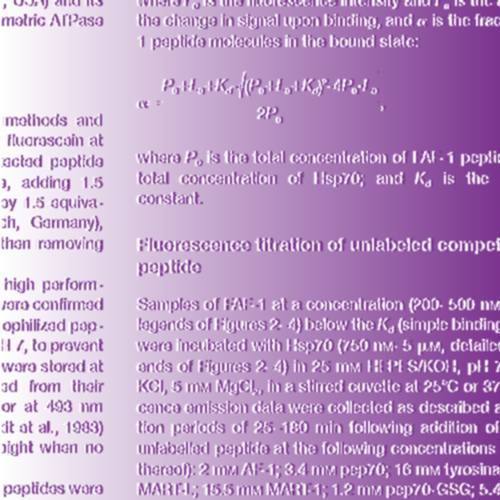Interaction of human heat shock protein 70 with tumor-associated peptides
01-Apr-2009
Biological Chemistry, 2009, 390 , 4, 305- 12 published on 01.04.2009
Biological Chemistry, online article
Biological Chemistry, online article
Molecular chaperones of the heat shock protein 70 (Hsp70) family play a crucial role in the presentation of exogenous antigenic peptides by antigen-presenting cells (APCs). In a combined biochemical and immuno-logical approach, we characterize the biochemical interaction of tumor-associated peptides with human Hsp70 and show that the strength of this interaction determines the efficacy of immunological cross-presentation of the antigenic sequences by APCs. A fluorescein-labeled cytosolic mammalian Hsc70 binding peptide is shown to interact with human Hsp70 molecules with high affinity (Kd=0.58 [mu]M at 25[degrees]C). Competition experiments demonstrate weaker binding by Hsp70 of antigenic peptides derived from the tumor-associated proteins tyrosinase (Kd=32 [mu]M) and melanoma antigen recognized by T cells (MART-1) (Kd=2.4 mM). Adding a peptide sequence (pep70) with high Hsp70 binding affinity (Kd=0.04 mM) to the tumor-associated peptides enables them to strongly interact with Hsp70. Presentation of tumor-associated peptides by B cells resulting in T cell activation in vitro is enhanced by Hsp70 when the tumor-associated peptides contain the Hsp70 binding sequence. This observation has relevance for vaccine design, as augmented transfer of tumor-associated antigens to APCs is closely linked to the vaccine's efficacy of T cell stimulation.











